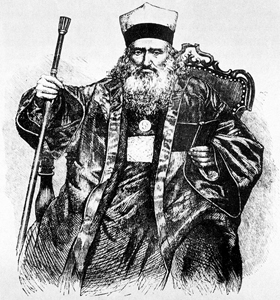Image Details

Russian National Library, Encyclopaedia Judaica
Patriarchal and prosperous, Abraham Firkovich (1786–1874) belonged to the Jewish Karaite sect, which regarded the Bible as its sole authority and rejected the rabbinic teachings contained in the Talmud. Firkovich left his hometown of Lutsk, Poland, and moved to a Karaite community in the Crimea, where Russian authorities offered Karaite Jews preferential treatment over rabbinic Jews. Determined to improve the Karaites’ position in the Crimea by further distancing his sect from other Jews, Firkovich began searching for manuscripts and tombstones that would prove the Karaites had settled in the Crimea as early as the sixth century B.C.E. He acquired 15,000 manuscripts—the largest private collection amassed at the time—including the Leningrad Codex. He later sold much of the collection to the St. Petersburg Imperial Library, despite a warning inscribed in the Leningrad Codex that puts “a curse on whoever steals it, sells it or exchanges it.”
